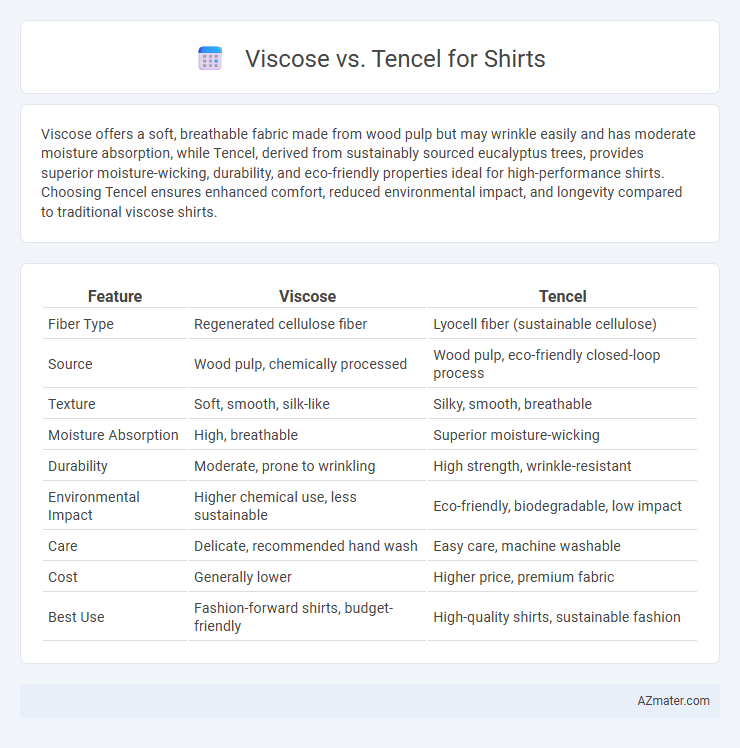Viscose offers a soft, breathable fabric made from wood pulp but may wrinkle easily and has moderate moisture absorption, while Tencel, derived from sustainably sourced eucalyptus trees, provides superior moisture-wicking, durability, and eco-friendly properties ideal for high-performance shirts. Choosing Tencel ensures enhanced comfort, reduced environmental impact, and longevity compared to traditional viscose shirts.
Table of Comparison
| Feature | Viscose | Tencel |
|---|---|---|
| Fiber Type | Regenerated cellulose fiber | Lyocell fiber (sustainable cellulose) |
| Source | Wood pulp, chemically processed | Wood pulp, eco-friendly closed-loop process |
| Texture | Soft, smooth, silk-like | Silky, smooth, breathable |
| Moisture Absorption | High, breathable | Superior moisture-wicking |
| Durability | Moderate, prone to wrinkling | High strength, wrinkle-resistant |
| Environmental Impact | Higher chemical use, less sustainable | Eco-friendly, biodegradable, low impact |
| Care | Delicate, recommended hand wash | Easy care, machine washable |
| Cost | Generally lower | Higher price, premium fabric |
| Best Use | Fashion-forward shirts, budget-friendly | High-quality shirts, sustainable fashion |
What is Viscose?
Viscose is a semi-synthetic fiber made from regenerated cellulose derived primarily from wood pulp, often sourced from beech, pine, and eucalyptus trees. It offers a soft, breathable texture similar to natural fibers, making it a popular choice for shirts due to its smooth drape and moisture-wicking properties. Compared to Tencel, viscose provides a silky feel but tends to be less environmentally sustainable and may lose strength when wet.
What is Tencel?
Tencel, a brand name for lyocell fiber, is produced from sustainably sourced eucalyptus wood using an environmentally friendly closed-loop process that recycles water and solvents. It offers superior breathability, moisture-wicking, and softness compared to viscose, making it ideal for comfortable, durable shirts. Tencel's natural biodegradability and resistance to wrinkles enhance fabric longevity and eco-conscious fashion choices.
Production Process: Viscose vs Tencel
Viscose production involves chemically treating wood pulp with carbon disulfide and sodium hydroxide to produce a viscous solution that is spun into fibers, often resulting in higher environmental concerns due to toxic chemical use and waste. Tencel, also known as lyocell, utilizes a closed-loop production process where wood pulp is dissolved in a non-toxic organic solvent, primarily N-methylmorpholine N-oxide, enabling higher sustainability and lower ecological impact. The closed-loop system in Tencel production recycles over 99% of solvents, significantly reducing pollution compared to the conventional viscose method.
Environmental Impact Comparison
Viscose production involves significant deforestation and chemical-intensive processing, leading to habitat loss and water pollution, whereas Tencel, derived from sustainably managed eucalyptus forests, employs a closed-loop process that recycles water and solvents, drastically reducing environmental footprint. Tencel's biodegradability and lower carbon emissions make it a more sustainable fabric choice for shirts compared to conventional viscose. Choosing Tencel supports reduced chemical waste discharge and promotes forestry sustainability aligning with eco-friendly apparel manufacturing.
Breathability and Comfort
Viscose and Tencel fabrics both offer excellent breathability and comfort, with Tencel outperforming viscose due to its moisture-wicking properties and smooth fiber structure that reduces skin irritation. Tencel, made from sustainably sourced eucalyptus wood pulp, promotes superior airflow and softness, making it ideal for sensitive skin and long wear. Viscose provides a lightweight and silky feel but tends to absorb moisture more slowly, which can reduce breathability in hot, humid conditions.
Durability and Longevity
Viscose shirts tend to have moderate durability, as the fabric is prone to weakening when exposed to moisture and frequent washing, which can reduce longevity. Tencel, made from sustainably sourced wood pulp, offers superior strength and resilience, maintaining its shape and color even after multiple washes, resulting in enhanced durability and longer lifespan. Choosing Tencel for shirts ensures a more durable garment that withstands wear and retains quality over time.
Moisture Absorption and Performance
Viscose and Tencel both offer excellent moisture absorption properties, with Tencel outperforming viscose due to its natural lyocell fibers that wick moisture efficiently and dry faster, enhancing comfort during wear. Tencel's biodegradable and eco-friendly production process also results in superior breathability and softness, making it ideal for performance shirts used in active or warm conditions. Viscose, while soft and breathable, tends to retain moisture longer, which can reduce comfort and lead to slower drying times compared to Tencel.
Skin Sensitivity and Hypoallergenic Properties
Viscose is a semi-synthetic fiber made from wood pulp, offering a soft feel but may cause irritation for those with sensitive skin due to chemical treatments during production. Tencel, derived from sustainable eucalyptus wood pulp through a closed-loop process, boasts superior hypoallergenic properties, making it ideal for individuals with skin sensitivities or allergies. Its moisture-wicking and breathable nature helps reduce skin irritation and promotes comfort throughout the day.
Care and Maintenance Differences
Viscose shirts require gentle hand washing or cold machine cycles to prevent fabric weakening, with careful avoidance of high heat during drying to reduce shrinkage. Tencel shirts offer easier care due to their moisture-resistant properties, allowing for machine washing in warm water and low-heat tumble drying without significant risk of damage. Both fabrics benefit from ironing at low temperatures, but Tencel's durability makes it more resilient to wrinkles and prolonged wear.
Price and Availability for Shirts
Viscose shirts are generally more affordable and widely available due to the established production infrastructure and lower manufacturing costs compared to Tencel. Tencel shirts tend to have a higher price point reflecting their sustainable sourcing and eco-friendly production processes, which can limit their availability primarily to specialty or eco-conscious retailers. Consumers seeking cost-effective and easily accessible options often choose viscose, while those prioritizing sustainability and fabric performance may opt for Tencel despite its premium price.

Infographic: Viscose vs Tencel for Shirt
 azmater.com
azmater.com